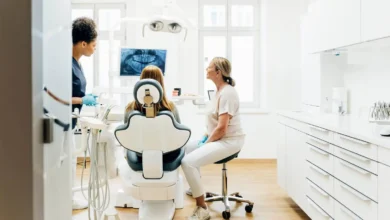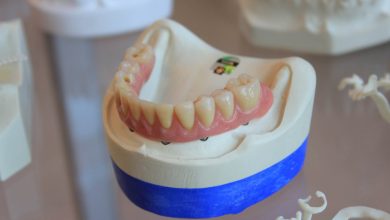The Complete Guide to Daily Dental Care: Tips for a Brighter Smile

The pursuit of good dental care and hygiene is more than just a route to a captivating smile; it’s a vital element of your total wellness and health. Proper dental hygiene not only enhances your appearance but also plays a crucial role in preventing various health issues, contributing significantly to your overall physical and mental well-being. A consistent and effective oral care routine can boost your confidence, ensuring that your smile is not just beautiful but also a reflection of a healthy body and mind. In this article, you’ll find all the essential guidelines and tips to maintain excellent dental hygiene. Easy-to-follow strategies to help you uphold your dental health, making sure every aspect of your oral care routine is covered. Whether you’re looking to refine your daily dental regimen or seeking comprehensive advice, this article is your one-stop resource for all things related to dental wellness.
1. Understanding the Basics of Oral Hygiene
Oral hygiene is the cornerstone of a healthy mouth. It involves more than just preventing bad breath or tooth decay; it’s about maintaining the health of your teeth, gums, and entire mouth. Good oral hygiene prevents plaque buildup, which is the main cause of gum disease and cavities. It also plays a critical role in preventing more serious health issues linked to poor oral health, such as heart disease and diabetes. Thus, understanding and practicing basic oral hygiene is essential for anyone aiming for a healthy, beautiful smile.
2. Choosing the Right Dental Products
Navigating the wide range of dental care products available in the market can be overwhelming, yet selecting the right ones is essential for maintaining good oral health. When choosing a toothbrush, it’s best to go for one with soft bristles, as this helps in preventing gum damage. Fluoride toothpaste is also highly recommended due to its effectiveness in combating tooth decay.
For those exploring orthodontic treatments, options like Invisalign have become increasingly popular. Invisalign for Adults offers a discreet and comfortable way to straighten teeth, making it a preferred choice for many. If you’re opting for this treatment, it’s important to choose dental care products that complement it. Invisalign wearers, for instance, might benefit from a specific type of floss or interdental cleaners designed to maintain oral hygiene without hindering the treatment process. Ensuring that your dental care products align with your specific oral health needs, especially when undergoing specialized treatments like Invisalign, is key to achieving the best results.
3. The Art of Brushing
Brushing your teeth is a fundamental aspect of oral hygiene, but doing it correctly is key. Use a soft-bristled brush and fluoride toothpaste. Hold your brush at a 45-degree angle to your gums and use gentle, circular motions. Brush at least twice a day for two minutes each time, ensuring you cover all surfaces of your teeth, including the backs and the chewing surfaces. Don’t forget to brush your tongue, too, as bacteria lingering there can cause bad breath and other oral health issues.
4. Flossing: Why It’s Essential
While brushing is effective at cleaning the surface of your teeth, it doesn’t fully reach the spaces between them. That’s where flossing comes in. Flossing once a day helps remove food particles and plaque from these hard-to-reach areas, preventing gum disease and tooth decay. Wrap the floss around each tooth in a “C” shape and gently slide it beneath the gum line. Flossing requires a bit of technique, but with regular practice, it becomes an easy and integral part of your oral hygiene routine.
5. The Role of Mouthwash in Oral Hygiene
Mouthwash is often considered the final step in a comprehensive oral hygiene routine. It reaches areas that brushing and flossing might miss, helping to reduce the risk of gum disease and tooth decay. Mouthwashes with antibacterial properties can also help reduce plaque and fight bad breath. However, It’s important to remember that mouthwash is not a substitute for brushing and flossing, but should be used in addition to complete dental care.
6. Diet and Your Dental Health
A nutritious diet is a key player in the quest for optimal dental health. Foods high in sugars and acids can erode tooth enamel and promote tooth decay. Conversely, a diet rich in fruits, vegetables, dairy products, and lean proteins can strengthen gum area and teeth. Calcium-rich foods like milk and cheese bolster tooth enamel, while crunchy fruits and vegetables stimulate saliva flow, naturally cleansing the mouth. Remember, what you eat not only affects your body but also has a significant impact on your oral health.
7. The Importance of Hydration for Oral Health
Staying hydrated is essential for maintaining a healthy mouth. Saliva is your mouth’s first line of defense against tooth decay and gum disease, and dehydration can reduce saliva flow, leading to a dry mouth. A dry mouth is more susceptible to decay and infections. Drinking water regularly, especially after meals, can help wash away food particles and dilute acids produced by bacteria in your mouth, protecting your gum area.
8. Managing Sensitivity and Gum Health
Tooth sensitivity and gum health are common concerns that require special attention. Sensitivity can be managed with toothpaste designed for sensitive teeth, which helps to block the transmission of sensations from the tooth surface to the nerve. Gum health is crucial for overall dental well-being. Practice gentle brushing along the gum line and consider using a mouthwash designed for gum health. If you have persistent sensitivity or signs of gum disease, such as bleeding or swollen gums, it’s important to consult your dentist.
9. Regular Dental Checkups: A Necessity
Regular dental checkups are not just for cleaning; they are a crucial part of preventive oral health care. These visits allow your dentist to detect any early signs of problems such as cavities, gum disease, or oral cancer. Your dentist can also provide professional cleaning to remove plaque and tartar that you can’t clean yourself. Typically, a checkup every six months is recommended, but your dentist might suggest a more frequent schedule depending on your specific oral health needs.
10. Dealing with Dental Emergencies
Dental emergencies can occur at any time and require immediate attention. Common emergencies include a knocked-out tooth, a cracked tooth, or a severe toothache. In these cases, it’s important to know basic first aid, like rinsing the mouth with warm water and applying a cold compress for swelling. For a knocked-out tooth, keep it moist at all times, either by placing it back in the socket without touching the root or in milk. Always contact your dentist as soon as possible in case of any dental emergency.
Conclusion
Achieving and maintaining optimal oral health is a combination of daily care practices, a healthy diet, regular hydration, and professional dental checkups. By incorporating effective brushing and flossing techniques, paying attention to your diet, and staying hydrated, you can significantly contribute to the health of your teeth and gums. Regular visits to the dentist for checkups and managing any dental emergencies promptly are also essential. Remember, a bright smile reflects good oral health, and with these tips, you are well on your way to achieving that. Make these practices a part of your daily routine and enjoy the lifelong benefits of a healthy, bright smile.




